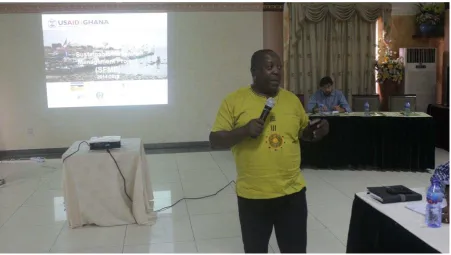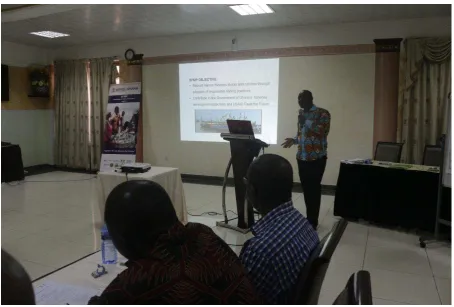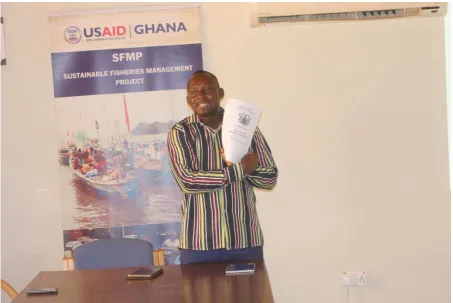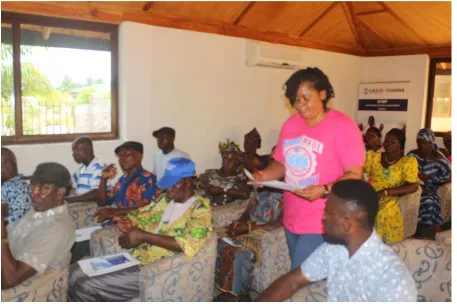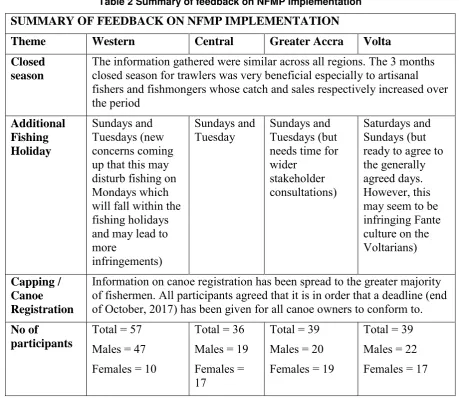SUSTAINABLE FISHERIES
MANAGEMENT PROJECT (SFMP)
National Association Executives
consensus building Workshops for
implementation of the National
Fisheries Management Plan
This publication is available electronically in the following locations:
The Coastal Resources Center
http://www.crc.uri.edu/projects_page/ghanasfmp/ Ghanalinks.org
https://ghanalinks.org/elibrary search term: SFMP
USAID Development Clearing House
https://dec.usaid.gov/dec/content/search.aspx search term: Ghana SFMP
For more information on the Ghana Sustainable Fisheries Management Project, contact:
USAID/Ghana Sustainable Fisheries Management Project Coastal Resources Center
Graduate School of Oceanography University of Rhode Island
220 South Ferry Rd.
Narragansett, RI 02882 USA
Tel: 401-874-6224 Fax: 401-874-6920 Email: [email protected]
Citation: Friends of the Nation (2017). National Association Executives consensus
building Workshops for implementation of the National Fisheries Management Plan. The USAID/Ghana Sustainable Fisheries Management Project (SFMP). Narragansett, RI: Coastal Resources Center, Graduate School of Oceanography, University of Rhode Island and Friends of the Nation. GH2014_ACT149_FoN 19 pp.
Authority/Disclaimer:
Prepared for USAID/Ghana under Cooperative Agreement (AID-641-A-15-00001), awarded on October 22, 2014 to the University of Rhode Island, and entitled the USAID/Ghana Sustainable Fisheries Management Project (SFMP).
This document is made possible by the support of the American People through the United States Agency for International Development (USAID). The views expressed and opinions contained in this report are those of the SFMP team and are not intended as statements of policy of either USAID or the cooperating organizations. As such, the contents of this report are the sole responsibility of the SFMP team and do not necessarily reflect the views of USAID or the United States Government.
Cover photo: Cross-section of participants at the workshop (Credit: Theophilus
Detailed Partner Contact Information:
USAID/Ghana Sustainable Fisheries Management Project (SFMP) 10 Obodai St., Mempeasem, East Legon, Accra, Ghana
Telephone: +233 0302 542497 Fax: +233 0302 542498
Maurice Knight Chief of Party [email protected]
Kofi Agbogah Senior Fisheries Advisor [email protected]
Nii Odenkey Abbey Communications Officer [email protected]
Bakari Nyari Monitoring and Evaluation Specialist [email protected] Brian Crawford Project Manager, CRC [email protected]
Ellis Ekekpi USAID AOR (acting) [email protected]
Kofi.Agbogah
Stephen Kankam
Hen Mpoano
38 J. Cross Cole St. Windy Ridge Takoradi, Ghana
233 312 020 701 Andre de Jager
SNV Netherlands Development Organisation #161, 10 Maseru Road,
E. Legon, Accra, Ghana 233 30 701 2440 Donkris Mevuta Kyei Yamoah
[email protected] Friends of the Nation Parks and Gardens Adiembra-Sekondi, Ghana
Darkuman Junction, Kaneshie Odokor Highway
Accra, Ghana 233 302 315894
For additional information on partner activities:
CRC/URI: http://www.crc.uri.edu
CEWEFIA: http://cewefia.weebly.com/
DAA: http://womenthrive.org/development-action-association-daa
Friends of the Nation: http://www.fonghana.org
Hen Mpoano: http://www.henmpoano.org
SNV: http://www.snvworld.org/en/countries/ghana
ACRONYMS
CBFMCs Community-Based Fisheries Management Committees CF Chief Fishermen
FEU Fisheries Enforcement Unit FiC Fisheries Commission FoN Friends of the Nation
GITA Ghana Inshore Trawlers Association GNCFC Ghana National Canoe Fishermen Council GTA Ghana Tuna Association
IEZ Inshore Exclusive Zone
MoFAD Ministry of Fisheries and Aquaculture Development NAFPTA National Fish Processors and Traders Association NFMP National Fisheries Management Plan
SFMP Sustainable Fisheries Management Project URI University of Rhode Island
TABLE OF CONTENTS
Contents
ACRONYMS ... iii
TABLE OF CONTENTS ... iv
LIST OF FIGURES ... iv
LIST OF TABLES ... iv
INTRODUCTION ... 1
BACKGROUND ... 3
NATIONAL ASSOCIATION EXECUTIVES CONSENSUS BUILDING WORKSHOPS FOR IMPLEMENTATION OF NFMP ... 4
Objective of workshop ... 4
Key Output of the Workshops ... 4
DETAIL SESSIONS OF THE WORKSHOPS ... 5
STATEMENT BY DONKRIS MEVUTA, EXECUTIVE DIRECTOR, FRIENDS OF THE NATION ... 6
OVERVIEW OF SFMP ... 6
NFMP PRESENTATION ... 7
FEEDBACK ON NFMP IMPLEMENTATION ... 12
Closed Season ... 12
Additional Fishing Holiday... 12
Capping / Canoe Registration ... 13
SUMMARY OF FEEDBACK ON NFMP IMPLEMENTATION ... 13
CONCLUSION ... 14
LIST OF FIGURES
Figure 1 Executive Director of Friends of the Nation delivering an opening statement ... 6Figure 2 Picture of Theophilus Boakye-Yiadom making his presentation ... 7
Figure 3 Mr. Kyei Kwadwo Yamoah making the presentation on the National Fisheries Management Plan (NFMP) ... 8
Figure 4 A picture of female participant in Volta Region commenting on the policy framework document ... 10
Figure 5 A picture of cross section of participant on one of the workshops ... 11
Figure 6 Mr. Donkris Mevuta of FoN addressing stakeholder-participants at the opening of the program ... 11
LIST OF TABLES
Table 1 Mr. Kyei's key issues with description ... 8INTRODUCTION
The United States Agency for International Development (USAID) has committed approximately $24 million US Dollars to the implementation of the USAID/Ghana
Sustainable Fisheries Management Project (SFMP). The objective of this five-year project (October 2014-October 2019) is to rebuild marine fisheries stocks and catches through adoption of responsible fishing practices. The project contributes to the Government of Ghana’s fisheries development objectives and USAID’s Feed the Future Initiative. More than 100,000 men and women involved in the local fishing industry will benefit from this project.
Working closely with the Ministry of Fisheries and Aquaculture Development and the Fisheries Commission, SFMP aims to end overfishing of key stocks important to local food security through:
Improved legal enabling conditions for co-management, use rights and effort-reduction strategies.
Strengthened information systems and science-informed decision-making.
Increased constituencies that provide the political and public support needed to rebuild fish stocks.
Implementation of applied management initiatives for several targeted fisheries ecosystems.
USAID selected the Coastal Resources Center (CRC) at The University of Rhode Island’s Graduate School of Oceanography as lead implementer of the SFMP. In leading the project, CRC works with The Ministry of Fisheries and Aquaculture Development and the Fisheries Commission along with a consortium of international and local partners, including SNV Netherlands Development Organization, SSG-Advisors, Hen Mpoano (HM), Friends of the Nation (FoN), the Central & Western Fish Mongers Improvement Association in Ghana (CEWEFIA), Daasgift Quality Foundation (DQF), the Development Action Association (DAA), and Spatial Solutions (SpS). The project contributes to the strengthening of marine and fisheries management educational, research and extension capabilities at the University of Cape Coast in conjunction with its Department of Fisheries and Aquatic Sciences. SFMP also collaborates with the USAID Coastal Sustainable Landscapes Project, and improves coastal spatial planning capacity of districts in the Central and Western Regions. The SFMP builds on the accomplishments of the previous USAID-Ghana Integrated Coastal and
Fisheries Governance (ICFG) Program. The USAID/Ghana SFMP is focusing its efforts on implementing Ghana’s National Marine Fisheries Management Plan, gazetted in 2015, with an emphasis on the small pelagics fisheries along the entire coastline as these stocks are the leading source of animal protein supply in the Ghanaian diet. The project is promoting ecosystem-based and adaptive management approaches, improved law enforcement and co-management of local fish stocks in lagoons and estuaries. Additionally, improvements in the value chain of smoked fish, important to tens of thousands of women fish processors and marketers are supported. The project is increasing its efforts to implement activities aimed at reducing child labor and trafficking in the fisheries sector in the Central (CR) and Western (WR) Regions of Ghana. Poverty is a major cause of child labor and trafficking in fishing communities which is exacerbated by declining fish catches.
Highlights of key Life-of-Project Results in the current M&E Plan include the following Management measures in place that allow for the recuperation of tens of thousands of
and a rebound of fish stocks, indirectly benefiting over 130,000 fishermen, fish processors and traders.
735,241 hectares of natural resources and fish habitat under more effective management.
Declines in Illegal, Unreported or Unregulated (IUU) fishing due to an increase in arrests and successful prosecutions and improved voluntary compliance.
UCC producing management-relevant, science-based information used in decision-making.
Inclusive participation by under-represented groups, women and youth in decision-making.
4,324 people (a majority women) benefiting from improved livelihoods, access to micro-credit, adoption of more efficient and profitable fish smokers and fish product value-added.
Several climate-resilient fishing communities and strengthened capacity of District Assemblies DAs) to promote and support resilient community policies and initiatives. A decline in child labor and trafficking in the fisheries sector in the Central Region
(CR).
A Fisheries Act that allows co-management and use rights in Ghana’s fisheries to be realized.
SFMP also is building consensus and support among stakeholders for the implementation of the National Marine Fisheries Management Plan as one of the means of achieving the goals of the project.
Also SFMP is working with national fishers’ associations to consider additional measures which may or may not be contained in the current NFMP such as a cap on numbers of canoes (managed access) an additional fishing holiday, or a seasonal closure for all fleets as
recommended by a science and technical working group (effort reduction).
SFMP efforts is at getting artisanal fishermen to agree to close fishing on Sundays across all landings sites. SFMP supported a proposal submitted by the GNCFC to MOFAD awaiting a ministerial directive.
BACKGROUND
Fish has always had far-reaching implications for food security in Ghana. Fish supplies naturally augment food availability and ensure good nutritional outcomes particularly for the poor and rural populations of the country. The vast number of people engaged in the fishing industry earn incomes that improve upon their access to food.
However, scientific evidence points to the fact that Ghana's fisheries are in crisis. Declining quantities of fish landed, coupled with increasing demand for fish for the country’s growing population has compelled Ghana to become a net importer of fish. These challenges have occurred largely due to the lack of effective governance of the fisheries.
To improve fisheries governance and address the challenges of the fisheries sector, the Government of Ghana developed the National Marine Fisheries Management Plan (NFMP) in 2015 in consultation with stakeholders.
The NFMP has good management proposals to reduced capacity in the fisheries that can
lead to conservation and revamp of the fish stocks. These measures include; closed seasons, establishment of marine protected areas, reduction of fishing days for trawlers, registration and moratorium for canoes, additional fishing holidays for canoes, etc. These are relevant measures which will contribute to medium- to long-term goals of rebuilding marine fish stocks. However, these measures have the potential to cause adverse impacts on the fishing communities. Therefore, the likely effects of these measures must be thoroughly assessed as a basis to recommend appropriate mitigation measures.
Closed Seasons: The management plan proposes the reduction of fishing days for trawlers
through the implementation of closed seasons which is to be implemented from one month to six months by the fifth (5th) year. This means that fishing trawlers could fish for only six
months in the fifth year of implementing the plan. This will negatively affect investors of the trawl sector including the crew members and their dependents in the short- to medium-term, the fish mongers, processes and chain of cold store operators who work with these trawlers. These may also affect the availability of fish on the market for consumers.
The scientific community has also proposed strongly that the closed season needs to be implemented for all fleets at the peak of the fishing season in the months of June, July,
August and September. This will imply that marine fishers will be denied fishing in the major fishing season. The implications of this on the local economy, food security, fishing
businesses, etc. are likely to be significant.
Registration and moratoriums for canoes: TheNFMP proposes the implementation of
opposition from the disadvantaged fishers who would be denied fishing for the period of the moratorium and has the potential to cause violent conflicts in the fisheries.
Additional fishing holidays for Canoes: The management plan proposes an addition
fishing holiday to the already existing holiday to make 2 fishing holidays in a week. This is also likely to face resistance from fishers because fishing opportunity will be lost Aside MPAs which may be in the form of permanent or seasonal area closures, closed fishing seasons may also be implemented as a means of ensuring the recovering of fish stocks. With closed seasons, periods are set aside where fishers are not allowed to fish during such times but may fish outside those seasons with the aim of decreasing the pressure on fish stocks. Resource use restrictions such as the implementation of closed fishing seasons, additional holidays, etc often disproportionately impact the most vulnerable stakeholders.
Establishment of Closed Areas/ Marine Protected Areas (MPAs): MPAs are recognized
as an ecosystem-based management tool for improving fisheries, protecting biodiversity and ecological functions, and protecting coastal zones from climate-change related impacts. MPAs are normally created to promote protection of marine biodiversity, but it is still unclear the degree to which no-take MPAs might contribute towards or undermine fisheries
management objectives. The establishment of closed areas and operation of Marine Protected Areas (MPAs) could potentially lead to conflicts with fisheries. Traditional fishing grounds may be set aside as protected areas where fishing activities are curtailed which could lead to different kinds of conflict at different levels with potential consequences.
Against this background it was urgent that for stakeholders especially, National Association Executives to be engaged to build consensus for implementation of NFMP.
NATIONAL ASSOCIATION EXECUTIVES CONSENSUS BUILDING
WORKSHOPS FOR IMPLEMENTATION OF NFMP
Series of workshops were held with executives of various fisheries associations including the Ghana National Canoe Fishermen Council (GNCFC), National Fish Processors and Traders Association (NAFPTA), Ghana Industrial Trawlers Association (GITA), Ghana Tuna Association (GTA), and NAFAG. Officials from the fisheries commission were also present to assist with proceedings.
At the workshops the impacts of implementation of the National Fisheries Management Plan (NFMP) were discussed thoroughly with the associations.
Objective of workshop
The workshops were organized against the backdrop of ensuring all-inclusive fisheries management and governance regime.
The main objective of the workshops was to solicit feedback from participants on the impacts of the NFMP implementation so far; and the way forward
Key Output of the Workshops
The workshops provided the platform to engage the broader stakeholders, whose input is needed to support the implementation of the NFMP.
The workshops also provided the platform for the associations to develop a plan on how to work with the Operational Committee for the implementation of the NMFMP at the regional and local scale.
The GNCFC used the platform created by the workshops to request for additional support to present their issues especially on consensus built to Fisheries Commission for approval and endorsement towards the implementation of the NFMP.
DETAIL SESSIONS OF THE WORKSHOPS
The following were the detail sessions of the workshops: Opening statement: this gave the purpose of meeting.
Overview of SFMP: this presentation explained the goal, objectives and activities of the SFMP project to participants. The purpose was to inform them about the project and solicit their support for the project implementation.
National Marine Fisheries Management Plan (NFMP) presentation: This presentation shared the key Fisheries challenges identified by Government and explained
government’s approach of addressing the challenges through the NFMP. The presentation explained the key management measures proposed in the NFMP which includes; Close season, mechanisms for reduction of fishing efforts, introduction of additional fishing holidays for canoes, registration and capping of canoes, fisheries co-management pilots, increased enforcement and other recommendable actions.
The objective of this presentation was to provide background information on the NFMP to inform participants to appreciate the content of the NFMP and create the platform for the participants to discuss it.
Open forum: this session created space and time for participants to interact, scrutinize the NFMP document, share experiences and provide input for the successful
STATEMENT BY DONKRIS MEVUTA, EXECUTIVE DIRECTOR,
FRIENDS OF THE NATION
Figure 1 Executive Director of Friends of the Nation delivering an opening statement
Mr. Donkris Mevuta, the Executive Director of Friends of the Nation (FoN) in his opening remarks said it was important to stick to the agenda of sharing practical experiences of the NFMP implementation and also help to review implementation without the usual blame game. He reminded participants to discuss objectively the way forward for effective NFMP implementation and what their role the association could play to support the process. He observed that there is the need for fisheries associations to be transparent and accountable in order to make itself attractive and to benefit from Government of Ghana’s support. He concluded that responsible fishing was urgently required across all fleets to rebuild the marine fish stocks.
OVERVIEW OF SFMP
Theophilus Boakye-Yiadom of FoN presented the overview of SFMP at the workshops. He informed participants of the USAID’s contribution as the funding agency for the SFMP. He explained the objectives of the SFMP to include:
Rebuild marine fisheries stocks and catches through adoption of responsible fishing practices.
Contribute to the Government of Ghana’s fisheries development objectives and USAID Feed the Future.
Figure 2 Picture of Theophilus Boakye-Yiadom making his presentation
NFMP PRESENTATION
The presentation of the National Fisheries Management Plan (NFMP) was made by Mr. Kyei Kwadwo Yamoah. In his presentation he explained that the section 42 (1) of the Fisheries Act of 2002 (Act 625) mandates the Fisheries Commission to prepare Management Plans for the Fisheries Sector. He noted that the current NFMP was therefore prepared by the mandate of the Fisheries Act and the plan is being implemented from 2015 to 2019 with the following key objectives:
To reduce the excessive pressure on Fish stock.
To ensure that fish stock within the marine water of Ghana are exploited within biological acceptable levels.
To ensure the effective fisheries legislation is implemented to protect The Nation’s fish resources.
To protect the marine habitats and biodiversity.
Figure 3 Mr. Kyei Kwadwo Yamoah making the presentation on the National Fisheries Management Plan (NFMP)
Mr. Kyei used the table below to explain the key issues to be addressed by the NFMP
Table 1 Mr. Kyei's key issues with description
Key issues Description
Inadequate information on Fisheries Biology and Stocks.
There has been very little scientific information known about the biology and current biomass levels of the main commercial species. Available
information suggests demersal fish stocks are overexploited and require rebuilding strategies.
Excessive fishing effort exerted in all fisheries
There has been excessive fishing capacity, especially in the trawl sector, requires effort reduction to more sustainable levels. The exact extent of the overcapacity in the canoe sector is not currently known. The overcapacity translates into levels of fishing effort above the MSY level of effort
representing both economic and biological overfishing. Urgent reduction of fishing effort by management action is required.
Weak
enforcement of Fisheries Regulations
Key issues Description
Low levels of protection of marine Biodiversity
There has been inadequate protection of specific marine ecosystems. Better protection of sensitive ecosystems is required to ensure replenishment of biomass, particularly of coastal areas which are known nursery areas of various commercial species. Closure of known spawning and nursery areas is required.
Inappropriate procedures in certifying fish for export.
There was need for catch monitoring and catch certification to ensure informed management decisions. There are no clear cut guidelines on verification of fish and fishery product for export often leading to rejects.
He explained that the NFMP had the following key measures to address the issues identified; a) Measures for Artisanal (Canoe);
To conduct Survey and registration of all Active Canoes and control new entrants to the fisheries after the registration.
Increase the Traditional Holiday to two days per week. Implement of co-management for the artisanal sector.
Modernization of the Fleets (fiberglass, steel, etc) replace old canoes.
Promote community group involvement in post-harvest and facilitating business opportunities.
Implement of Insurance and Pension Scheme. b) Measures for Trawlers
Reduction in fishing days for trawlers (scaled annually). Introduce Close Season (1-2months up to 4 months in a year). Control the Number and capacity of Vessels by:
Deletion of inactive boats.
50% reduction in fishing days over the next 3 years for Trawlers (scaled annually) Cancellation of licenses for violators of fisheries laws and regulations (All). Replacement scheme for registered vessels.
He noted that additional measures in the NFMP included;
Maintain and upgrade vessel monitoring system (VMS), Increase effectiveness of fisheries enforcement.
Enforce strictly provisions in Act to eliminate IUU fishing.
Collaborate effectively with regional bodies on MCS strategies to combat IUU fishing. Bycatch mitigation measures.
Develop a Data Collection Regime. Undertake Stock assessments survey.
He concluded that the NFMP is a very good document and had the following goal and purpose.
Goal: To rebuild fish stock to enhance the socio-economic conditions of fishing communities, create employment within National and International Framework and standards and improve food security as well as contribute to GDP and foreign exchange earnings.
Purpose: To provide a strategic framework for reversing the declining trend of fish resources and establish a sound management regime to ensure that fish stocks are exploited sustainably in an enhanced environment.
He explained that successful implementation of the NFMP will contribute to the rebuilding of the small pelagic stocks so there was need for stakeholders to support the implementation.
Figure 5 A picture of cross section of participant on one of the workshops
FEEDBACK ON NFMP IMPLEMENTATION
This session was done in a plenary and got participants discussing both the positive and negative impacts that have been experienced by the various fishing fleet operators as a result of implementation of the NFMP. The various plans discussed included closed season, additional fishing holidays and capping/canoe registration.
Closed Season
The participants informed that the closed season was targeted at the Trawlers and spanned 3-months (starting from November 2016). While the trawlers shared a bitter experience, the other fleet operators shared a more joyous experience.
It was well agreed by all participants that the closed season was well observed. During this fallow period, most of the industrial vessels resorted to mending of nets and repair of other gears. The one-most relevant experience shared by the trawlers was that fact that the closed season brought a lot of financial constraints to owners and crew on industrial trawl vessels. Nonetheless, stakeholders’ representative of the trawlers indicated their continuous support for the process and have therefore written to the fisheries commission to help assess the impacts of the closed season and how best to go about its implementation going forward. Other stakeholders, especially the women, explained the rationale behind their joy and praises for the Fisheries Commission (FiC) for implementing such a closed season. They explained that one major observation they made during the period is the increased fish stocks that were made available to canoe fishermen during their expeditions from November, 2016 through to March, 2017. This in effect led to improved sales by fishmongers in the major market centers such as Kumasi market, thereby increasing their profit margin. Quite interestingly, they hinted of an observation that some fish species that according to their perception had gone extinct were harvested during the closed season, which needs further studies.
Some allegations cropped up during the discussions which implied that the closed season eventually benefited the trawlers more than artisanal fisheries, since the trawlers used illegal means to trawl mid-water with illegal gears, after the closed season. By this the trawlers captured fish species which are mainly within the Inshore Exclusive Zone (IEZ). This is making them to continue landing juvenile fish. There is a yawning gap between the
conditions given the bottom trawlers and their activities on the ground, stated a participant.
The stakeholders therefore implored the Fisheries Commission to introduce and enforce a gear policy to enhance the benefits of the closed season. It was added that the trawlers should not be permitted to conduct mid-water trawling after the observation of the closed season. Matilda Quist of the Fisheries Commission used the opportunity to explain some concepts to the stakeholders. She hinted that trawlers who do bottom trawling were allowed to fish for only demersal species with a maximum by-catch of 15%. She noted that in the current licensing regime, even the 15% by-catch has been abolished effective end of first quarter of 2017. Hence no trawler is going to use the allowable by-catch caveat as an excuse to do mid-water trawling.
Additional Fishing Holiday
Central Region decided on Sunday in addition to Tuesday but are still waiting for approval from the council and the Fisheries Commission to announce and declare these days as fishing holidays. Greater Accra has asked for more time to allow wider consultations on the issue. They have actually agreed on Sundays and Tuesdays in principle but needs to consult widely. Western Region has agreed on Sunday as additional fishing holiday but there has been
concerns to hold on with its implementation to allow for more discussions. This is because others would prefer Mondays and Tuesdays instead of Sunday and Tuesday, with a fishing day in between. This is going to make implementation difficult, they said. Volta Region wish for Saturday and Sunday as fishing holidays, although they are ready to agree to the final verdict of the council.
Capping / Canoe Registration
The canoe registration process introduced by the Fisheries Commission has been quite successful. Most canoes have registered and have been embossed. However, about 5% have still not complied. The fisheries commission has given these canoes up to the end of October, 2017 to comply. Those who fail to comply will be automatically capped and be sanctioned by the Fisheries enforcement unit (FEU).
SUMMARY OF FEEDBACK ON NFMP IMPLEMENTATION
Table 2 below provides the feedback from participants on the NFMP Implementation
Table 2 Summary of feedback on NFMP Implementation
SUMMARY OF FEEDBACK ON NFMP IMPLEMENTATION
Theme Western Central Greater Accra Volta
Closed season
The information gathered were similar across all regions. The 3 months closed season for trawlers was very beneficial especially to artisanal fishers and fishmongers whose catch and sales respectively increased over the period will fall within the fishing holidays and may lead to more
infringements)
Sundays and
Tuesday Sundays and Tuesdays (but needs time for
Information on canoe registration has been spread to the greater majority of fishermen. All participants agreed that it is in order that a deadline (end of October, 2017) has been given for all canoe owners to conform to.
CONCLUSION
The workshops concluded that there was the urgent need to reduce fishing efforts and the close season was one of the effective ways to address efforts. The workshops strongly recommended that MOFAD should not allow any trawlers to land fish within the close season. (It was explained that some trawlers that have licence to fish in other countries (e.g. Togo, Ivory Coast, etc) landed fish purportedly caught from those countries to Ghana during the close season period; therefore, it was difficult for stakeholders to properly monitor the effectiveness of the close season).
The workshops also recommended the need for MOFAD to improve communication to all stakeholders on their various roles for the implementation of the close season.
